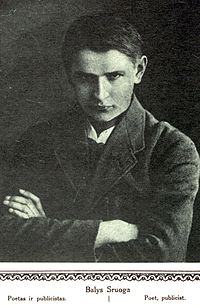Balys Sruoga
| Balys Sruoga | |
|---|---|
 |
|
| Born | Balys Sruoga February 2, 1896 near Biržai |
| Died | October 16, 1947 Vilnius |
| Nationality | Lithuanian |
| Ethnicity | Lithuanian |
| Genre | symbolic poetry, playwright, novelist |
| Notable works | Dievų miškas(Forest of the Gods) |
Balys Sruoga (February 2, 1896, near Biržai, Lithuania - October 16, 1947, Vilnius) was a Lithuanian poet, playwright, critic, and literary theorist.
He contributed to cultural journals from his early youth. His works were published by the liberal wing of the Lithuanian cultural movement, and also in various Lithuanian newspapers and other outlets (such as Aušrinė, Rygos Naujienos etc.). In 1914 he began studying literature in St. Petersburg, Russia, and later in Moscow, due to World War I and the Russian Revolution. In 1921 he enrolled in the University of Munich, where in 1924 he received his Ph.D for a doctoral thesis on Lithuanian folklore.
After returning to Lithuania, Sruoga taught at the University of Lithuania, and established a theater seminar that eventually became a course of study. He also wrote various articles on literature. From 1930 he began writing dramas, first Milžino paunksmė, later Radvila Perkūnas, Baisioji naktis and Aitvaras teisėjas. In 1939 he began teaching at Vilnius University.
Sruoga's best known work is the novel The Forest of the Gods (Dievų miškas), based on his own life experiences as a prisoner in Stutthof concentration camp, where he was sent in March 1943 together with forty-seven other Lithuanian intellectuals after the Nazis started a campaign against possible anti-Nazi agitation in occupied Lithuania.
...
Wikipedia
